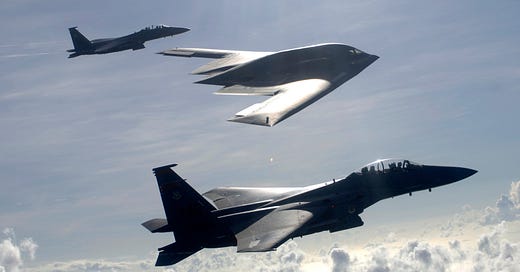The U.S. Will Not Win in Iran
The conflict in Iran will not end quickly. Yet again, the U.S. has entered a long costly war that it is not ready to fight.
By Jeremi Suri
If history teaches anything, it is that “spectacular military success” rarely comes quickly and easily. This is especially true when a powerful country relies on “magnificent machines” that drop bombs from the air. The bombs can blow up a lot of things, now with startling accuracy, but that is never enough. As the great observer of war, Carl von Clausewitz, reminds us: humiliating the enemy in a single battle is not the same as winning a war. Often, they are opposites.
The United States looked strong, brave, and sophisticated in striking Iran’s nuclear sites on Saturday, but it remains doubtful that the largest bombs in our arsenal destroyed their nuclear program. And it is now unimaginable that Iran will reopen negotiations of any kind with Washington. President Trump lied to Tehran twice in the last two weeks, first about his opposition to Israeli military actions, and second about his waiting “two weeks” before deciding on U.S. strikes. Why would Iranian leaders ever trust his willingness to stick to his word again? The U.S. attacks on Iran ended negotiations and put the two countries at war – a direct U.S.-Iran war that Trump started.
Whether the current government in Iran survives or not, competent leaders of the country (and other countries in the region) will see the United States as a hostile, aggressive force. We invaded Iraq in 2003, we bombed Libya in 2011, and now we are striking Iran. In the prior two cases, American military intervention created more violent resistance to the United States, more terrorism, and more extremism throughout the region. Our allies were weakened, and Americans became less safe. That is not how you win wars.
Conflict with Iran will be even worse. Remember, first, that Persians have conducted statecraft and military affairs for more than 2500 years, and they were never colonized. They have deep civilizational knowledge about defending themselves and hurting invaders. They have a proud ethno-cultural identity that will rally citizens to resistance, even if they hate their own government. They will not see the United States or Israel or Iranian exile figures (remember Ahmed Chalabi in Iraq?) as preferable.
Almost a quarter of the world’s total oil supply flows through the narrow Strait of Hormuz along Iran’s southern border. For decades, experts have worried that Iran could block this vital shipping route with mines, missiles, and other inexpensive hardware that they have stockpiled. The United States Navy, with assets in the Persian Gulf nearby, will have to clear the waters, which it is capable of doing, but that difficult work will expose American sailors and ships to deadly fire from Iranian forces. The casualties could be very high, the time to clear the waters could be extensive (months, not weeks), and the costs to global markets from skyrocketing oil prices could induce a deep recession, especially when the world economy is already precarious.
In addition, there are approximately 40,000 U.S. soldiers stationed on bases in Iraq, Saudi Arabia, Qatar, and other countries close to Iran. They are all vulnerable to Iranian rocket strikes, and they do not benefit from the same anti-missile systems deployed around Israel, with U.S. assistance. American soldiers are sitting ducks in the Middle East, vulnerable to unsophisticated attacks today as they were during the Iraq War, when 4,400 were killed and 32,000 were wounded.
The United States would, of course, respond to a blockage of the Strait of Hormuz and attacks on American servicepeople with more extensive bombing in Iran, similar to what Israel is already doing. That was also the U.S. response in Iraq and Libya, and in Afghanistan and Vietnam. More bombing, however, encourages more attacks on Americans, and the cycle continues.
In every one of these prior cases, the cycle of violence only ended when the United States stopped bombing and accepted less than its war aims – a government-dominated by Iran in Iraq, a regime controlled by violent militias in Libya, the return of the Taliban in Afghanistan, and communist victory in Vietnam. Recent efforts by the Trump administration to bomb the Houthis in Yemen also failed, with the Houthis threatening American shipping yet again.
The historical record is clear: bombing kills people, but it bolsters resistance to American power. This is what anyone who has studied war knows. Clausewitz was right. War is about will. A smaller, coherent society that feels attacked by a bigger bully from a distance has many ways of inflicting pain on the bully. And that is what they do. They scratch and bite and pull the bully’s hair. They fight back hard and turn their weaknesses into opportunities for harming the attacker. Russia is learning this in Ukraine.
Over its history, the United States has proven unwilling to accept the pain of fighting stubborn, weaker, resisting adversaries. We have rarely defeated them. We have generally deployed “magnificent machines,” then limited soldiers, and then we have withdrawn, dissatisfied and regretful that we ever entered the war in the first place. This is particularly true when Washington begins military actions without strong support at home, as is the case today.
So, here we are again. We face a dangerous, aggressive adversary in Iran, but we have overestimated our power to win fast and underestimated their power to resist and wear us down. We have created unrealistic expectations and promised more than is possible. We are not ready for a long, difficult, costly war, but that is what we have entered.
None of these historical observations detracts from the real dangers of a nuclear-armed Iran and its long history of supporting terrorists around the world. The Iranian government is an aggressive, anti-Semitic regime. But wars are not won on comparative virtue or vice. If anything, the risk is that attacking Iran, as Israel and the United States have done, makes us look more like them. Successful wars require clear-eyed strategic thinking about how to best reduce threats at manageable costs. That usually involves a mix of diplomacy, multilateralism, and compromise.
What we are doing now – flexing our muscles and making big threats – is more the logic of the middle-school playground than careful, strategic geopolitics. The Iranians will not give up because we are stronger. They will find ways to fight. We must be ready for a long conflict or a reversal of our course – neither of which this administration, like its predecessors, has contemplated. If you think you are destined to win, then defeat is at your doorstep.
“War is not algebra,” Clausewitz famously reminded readers. The largest arsenal does not always win. War favors those who have more to lose and those most willing to fight for the little that they have. That is not the United States in Iran, which is why this is a war we will not win.
Also see in:
German, Turkish, Chinese, Spanish
Jeremi Suri holds the Mack Brown Distinguished Chair for Leadership in Global Affairs at the University of Texas at Austin. He is a professor in the University's Department of History and the LBJ School of Public Affairs. Professor Suri is the author and editor of eleven books on politics and foreign policy, most recently: Civil War By Other Means: America’s Long and Unfinished Fight for Democracy. His other books include: The Impossible Presidency: The Rise and Fall of America’s Highest Office; Liberty’s Surest Guardian: American Nation-Building from the Founders to Obama; Henry Kissinger and the American Century; and Power and Protest: Global Revolution and the Rise of Détente. His writings appear in the New York Times, Washington Post, Wall Street Journal, CNN.com, Atlantic, Newsweek, Time, Wired, Foreign Affairs, Foreign Policy, and other media. Professor Suri is a popular public lecturer and comments frequently on radio and television news. His writing and teaching have received numerous prizes, including the President’s Associates Teaching Excellence Award from the University of Texas and the Pro Bene Meritis Award for Contributions to the Liberal Arts. Professor Suri hosts a weekly podcast, “This is Democracy.”







There were reasons both for and against attacking Iran with regard to their nuclear activities. The President’s decision to wait two weeks to think things through and come up with the best approach for the American people and the country is part of a normal process. However, something got in the way of this approach. Something call his mega sized ego which he was unable to control. The insurmountable fear that TACO would be all over the media was more than he was able to tolerate so he had to show the world he would not chicken out again. Subsequently a very bad decision was made (and probably without actual thought) that put America back into another Middle East war. One of the major things he was elected not to do.
Thanks for the reasoned analysis, Jeremi. How many of these head-long rushes into aggression do we have to launch before we realize they never turn out the way we want?